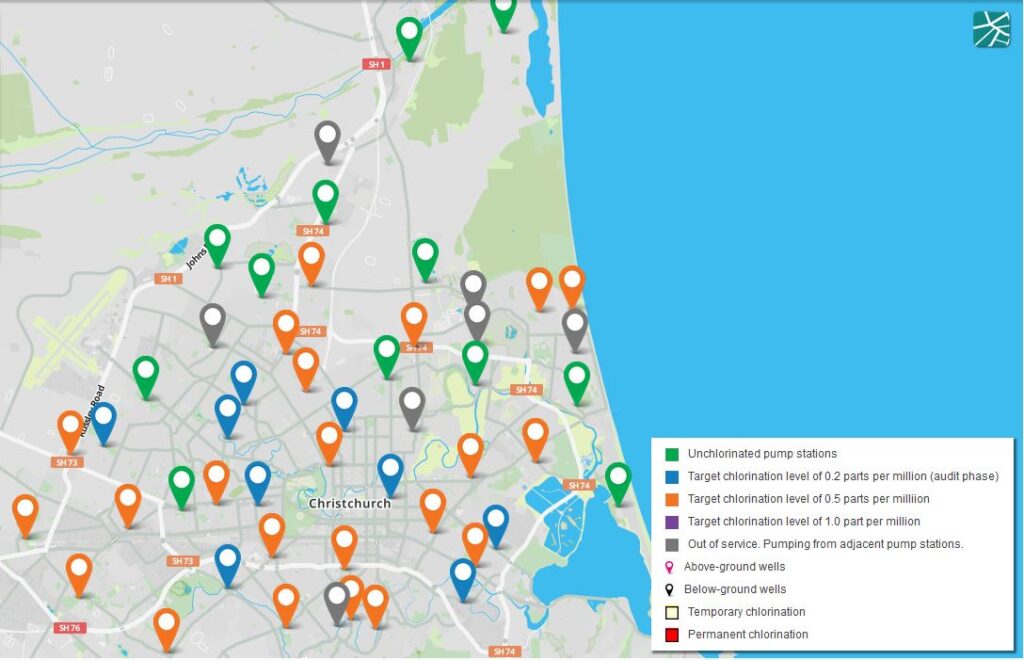Over the last year, we’ve had a number of articles from Garry on chlorination and one talk. On 28 August 2019, CCC’s head of the Three Waters, Helen Beaumont, spoke right at the time when the city was hit with a change in the regulatory system. Subsequent articles were published in February (background) and July (privatisation risk) 2020. Axel wrote a summary of the situation in September 2019, as it was the most common question that people had when he was out door-knocking. And while he was standing for a regional council seat, people were most concerned about an issue that has nothing to do with the regional council. So here is how he sees it.
September 2019 article
Water pumping stations that have recently been repaired are as safe as those that were repaired earlier. It might be frustrating for residents to know that the technical difference between wellhead safety of one neighbourhood who does have chlorinated water, to one that is chlorine-free, is simply the date at which they were signed off. The government in Wellington recently shifted the goal posts and that prevents chlorination being turned off on the recently repaired well heads. That’s fundamentally wrong. Here’s the back story.
It came as a shock to Christchurch citizens first thing in 2018 when we all learned that our water was going to be chlorinated. This followed the discovery that many of the well heads at the pumping stations had cracks from the earthquakes, potentially allowing contaminated water to enter the bores during floods and heavy rain. We certainly don’t want a repeat of what happened in Havelock North in August 2016, when 5,500 of the town’s 13,000 residents fell ill with Campylobacter, caused by run-off from a sheep station that entered a borehole during heavy rain. Four of their residents died.
Drinking water supply falls within the city council’s responsibility and they thus announced a temporary and reasonably short term measure to have chlorination. The city council totally underestimated how long it would take to repair all the 50+ well heads. The time when all pumping stations would be chlorine-free got delayed several times.
The process of turning off chlorine for a particular pump station is, or rather was, as follows:
- City council finishes the well head repairs at a pump station
- An independent specialist signs off on the repairs
- A Drinking Water Assessor, employed by the District Health Board, confirms on behalf of the Ministry of Health that repairs have removed any risks.
- City council then turns off the chlorination at that pump station
In July 2019, central government brought in new water regulations and foreshadowed the establishment of a drinking water regulator. The new rules left no choice for the Canterbury District Health Board (CDHB) but to stop signing off on further well head repairs.
It is important to note that our CDHB initially proposed to instruct the city council to start chlorinating those pump stations once more where chlorine had already been removed. The Canterbury Medical Officer of Health, Dr Alistair Humphrey, strenuously argued that the well heads already signed off are safe and in the end, his view prevailed, the CDHB changed its mind, and blanket chlorination did not get introduced in Christchurch.
What this means is that we now have two standards in Christchurch:
- Well heads repaired and certified before August 2019 have had their chlorination removed.
- Well heads repaired since August 2019 will not have their chlorination removed as the government has stopped the District Health Boards from signing off on the repairs (step 3 above).
There is no technical, practical, or safety difference between the various repaired well heads apart from the fact that the government has imposed a “one-size-fits-all” rule to the country that shifts the goal posts. Whether your water supply has chlorine in it or not is thus decided by the lottery in which order the city council did its repairs. And this is fundamentally wrong.
Axel’s advice to our elected members, when this item was discussed in late August, was to ignore the nonsensical government decision of preventing step 3 and proceed with turning chlorination off as soon as step 2 above had been done. But the elected members buckled to government’s pressure and decided to continue with chlorination even after the well heads had been repaired. In Axel’s view, that was the wrong decision.
This is a good example of why it is important for local politicians to be independent of any political parties. Many of our elected members hold party membership of the largest government party. To defy the government’s ruling would basically be a revolt against people who are higher up the pecking order in one and the same party. That could be a party-career limiting move and hence, those elected members’ actions and decisions may be a lot more muted than had the government been formed by a different party. Only elected members who are independent of any political party can always speak out without the fear of upsetting politicians in Wellington.
Mayor Lianne Dalziel has pointed out the interesting double-standard that applies to our water, where central government does not seem to care much about nitrate pollution. Axel absolutely shares her sentiment:
Dalziel wondered why the Government was pushing a “precautionary approach when it comes to chlorine but not with nitrates”.
Paul Gorman, The Press, 17 September 2019

Leave a Reply